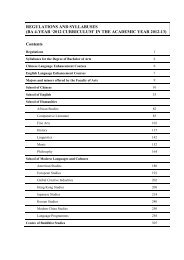Bachelor of Arts (BA) - The University of Hong Kong
Bachelor of Arts (BA) - The University of Hong Kong
Bachelor of Arts (BA) - The University of Hong Kong
You also want an ePaper? Increase the reach of your titles
YUMPU automatically turns print PDFs into web optimized ePapers that Google loves.
303POLI0058.Managing the global economy (6 credits)This course examines the interaction <strong>of</strong> politics and economics in international relations with referenceto the world economy's most dynamic region - the Asia-Pacific. It identifies the political considerationsin global economic relations and analyzes the impact <strong>of</strong> economic factors on international relations.With reference to developments in the Asia-Pacific region, the course addresses four major areas. First,different theoretical perspectives on the free market global economy such as free trade versusenvironmental protection and competing priorities in different countries. Second, the key institutions inthe global economic system -- the World Bank, the International Monetary Fund, and the World TradeOrganization (WTO). Third, critical issues in East Asia such as the role <strong>of</strong> the state in economicmanagement, security and political factors in international economic relations and the prospects <strong>of</strong>regional economic co-operation. Finally, the major political challenges arising from economic conflictsin individual countries in the Asia-Pacific region.POLI0059.China and the world (6 credits)China's place in the world has changed dramatically since the establishment <strong>of</strong> the People's Republic <strong>of</strong>China in 1949. How do we account for the transformation <strong>of</strong> the country's position from being a Sovietally challenging the West, to an independent radical revolutionary state, and then reform-mindedcountry eager to join the international community? As communism collapsed elsewhere after the end <strong>of</strong>the Cold War China is becoming an emerging global power practising 'socialism with Chinesecharacteristics'. How do we understand and analyze China's relations with the rest <strong>of</strong> the world? Thiscourse examines China's interaction with the rest <strong>of</strong> the world since 1949, with reference on competingperspectives including power-political, economic inter-dependence and historical-cultural analysis.<strong>The</strong> course concludes with a critical assessment <strong>of</strong> China's position in a globalizing world.POLI0060.Public financial management (6 credits)<strong>The</strong> purpose <strong>of</strong> this course is to provide an overview <strong>of</strong> financial management in the public sector froma theoretical and practical perspective. <strong>The</strong> focus is primarily on the conceptual, methodological andinstitutional aspects <strong>of</strong> public expenditure and revenue management. <strong>The</strong> subject is approached largelyfrom an economic standpoint, but there is also some exposure to accounting principles. However, noprevious knowledge <strong>of</strong> either economics or accounting is assumed.POLI0061.<strong>Hong</strong> <strong>Kong</strong> and South China: <strong>The</strong> political economy <strong>of</strong> regional development andcooperation (6 credits)<strong>The</strong> phenomenal economic growth in south China since the late 1970s is a major event in contemporaryChina. <strong>The</strong> growing integration between <strong>Hong</strong> <strong>Kong</strong> and south China has pr<strong>of</strong>ound implications notonly for this region, but also for China and Asia as a whole. This course aims to analyze such animportant development and its many implications. It is divided into three parts. Part I <strong>of</strong>fers a theoreticaland historical overview <strong>of</strong> the development <strong>of</strong> the south China region. <strong>The</strong>oretical approaches in thestudy <strong>of</strong> regionalism, intergovernmental relations and globalization will be introduced and theirrelevance for studying south China will be explored. Part II overviews the social, economic andpolitical links between <strong>Hong</strong> <strong>Kong</strong> and Greater China and the developmental experience <strong>of</strong> south Chinasince the late 1970s. Part III will focus on several key issues in regional development and cooperationin the south China region, including intergovernmental cooperation mechanisms, economic andtechnological development, demographic flows, boundary control, transportation and infra-structuraldevelopment, as well as environmental management.
















